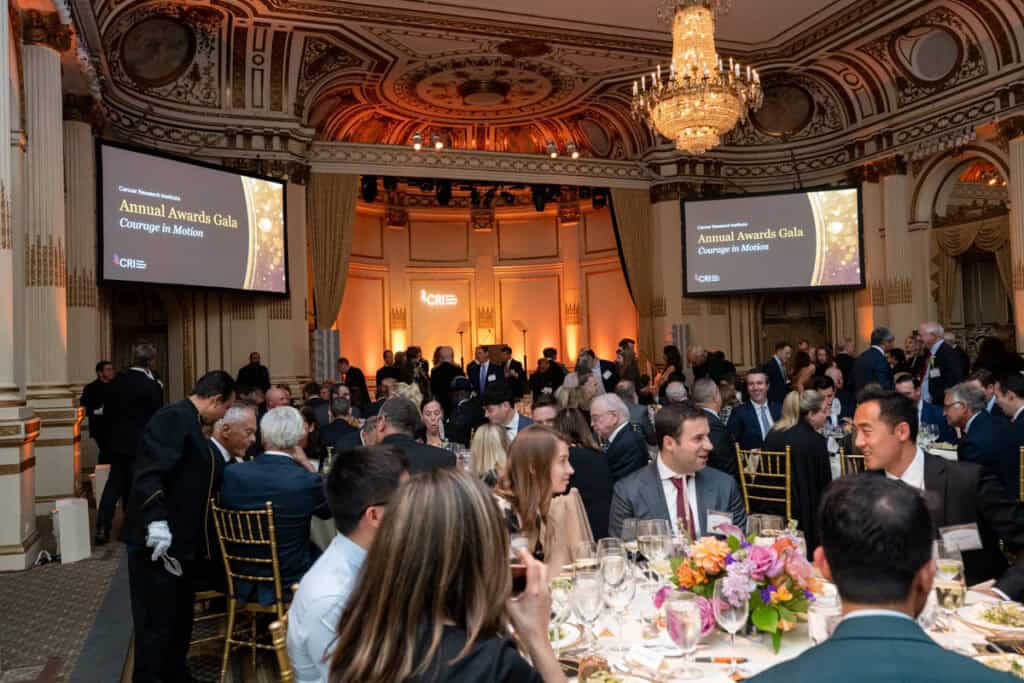
The Cancer Research Institute (CRI) hosted its 2025 Annual Awards Gala on Tuesday, October 21, at the Plaza Hotel in New York City, to honor those courageously pioneering, supporting, and providing access to life-saving cancer immunotherapy. The Gala’s theme, Courage in Motion, was on full display throughout the night, with a grateful acknowledgement to the past and a hopeful eye focused on the future.
“When data becomes discovery, and discovery becomes treatment, we move faster toward cures—because cancer doesn’t wait, and the people affected by it can’t afford to, either,” said CRI’s CEO Alicia Zhou, PhD, as she opened the night. “This is Courage in Motion.”
In a night of celebration hosted by Emmy award-winning journalist Cynthia McFadden, CRI honored those embodying Courage in Motion, presenting awards to several leading scientists in the field of cancer immunotherapy, clinicians who advocate for their patients, and supporters who make this work possible. The 2025 CRI Awards Gala celebrated the progress that happens when courage meets science, while raising over $1M for continued lifesaving cancer research.
“We are living under an unprecedented attack on science when our knowledge and tools are greater than ever. We will continue our work to prove them wrong.”
– Dr. Alan Korman
Recognizing Transformative Contributions in Immunology
The evening’s first honor, the William B. Coley Award for Distinguished Research in Basic and Tumor Immunology, is awarded to scientists who have made significant contributions to the field of immunology. This prestigious award was bestowed upon two brilliant minds.
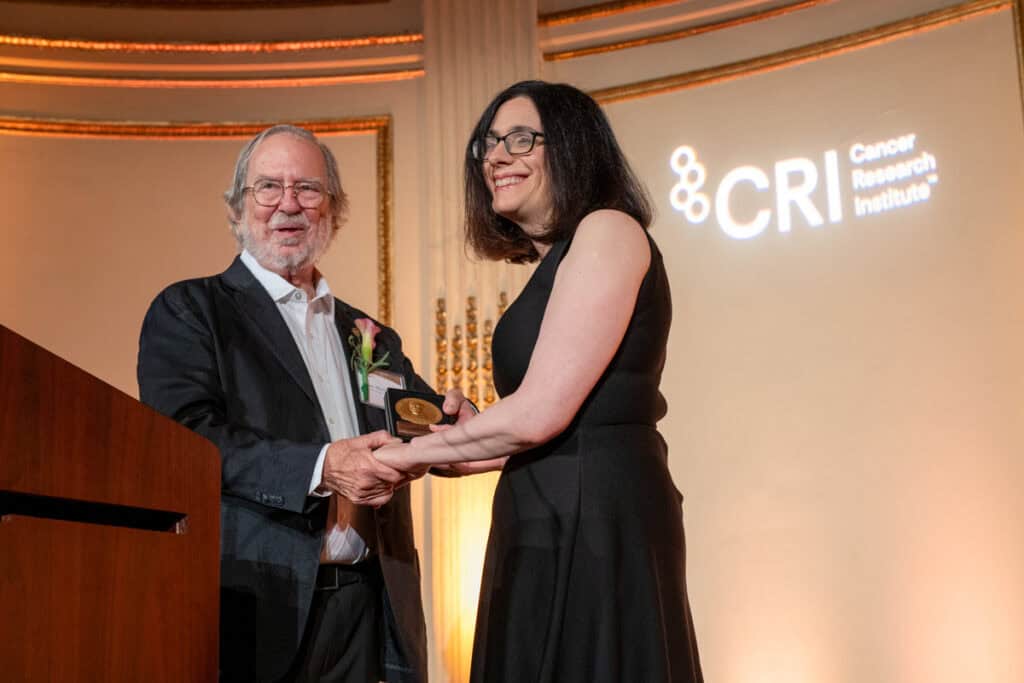
Aviv Regev, PhD, is the Head and Executive Vice President of Genentech Research and Early Development. She was awarded the Coley Award in Basic Immunology for her pioneering work, conducting one of the first single-cell studies of a solid tumor. Her leadership in the Human Cell Atlas and her innovative approaches to tumor immunology have opened new pathways for immunotherapy and precision medicine – advances that are ultimately reshaping how we treat cancer.
Alan Korman, PhD, is the Chief Scientific Officer at BlueSphere Bio. He was awarded the Coley Award in Tumor Immunology for his pivotal work in developing the checkpoint inhibitors that ultimately changed the outlook for patients with various cancers. His leadership and vision have bridged novel concepts to clinical outcomes, turning immune checkpoint blockage into a lifesaving reality for patients worldwide.
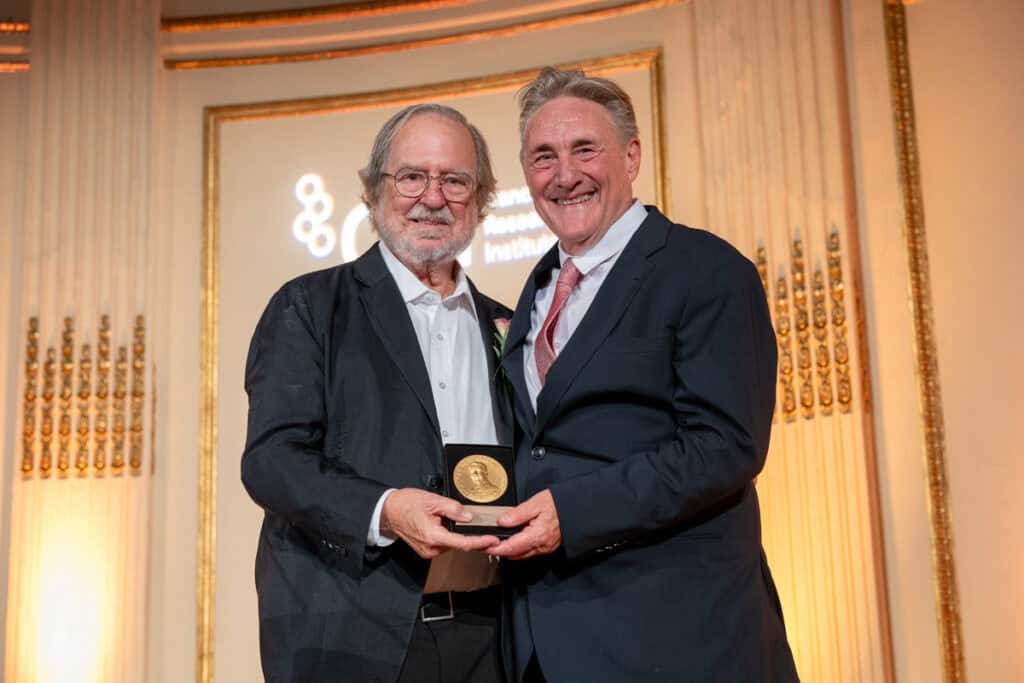
Both scientists expressed deep gratitude for the recognition, thanking those who have been part of their journey along the way.
Dr. Regev said during her remarks, “My deepest gratitude goes to the many patients and their families who participate in research, so that we can decipher the composition and function of our bodies in health, and ultimately, develop treatments for diseases.”
Similarly, Dr. Korman expressed deep gratitude for the many teams he’s worked with over the years and reminded the room of more than 300 guests that “ordinary science can bring extraordinary results.”
He also urged the scientists in the room to hold fast in the face of the current scientific climate.
“We are living under an unprecedented attack on science when our knowledge and tools are greater than ever,” he said. “We will continue our work to prove them wrong.”
The Coley Award was presented to Drs. Regev and Korman by Jim Allison, PhD, 2018 Nobel Laureate, Chair of Immunology and the Director of the Immunotherapy Platform at MD Anderson Cancer Center, and Director of CRI’s Scientific Advisory Council.
Celebrating Clinical Trial Milestones in Immunotherapy
Alongside these honors, CRI celebrated two major milestones in immunotherapy: the 15-year anniversary of the first ipilimumab (YervoyⓇ) clinical trial, and the 10-year anniversary of the ipilimumab + nivolumab (YervoyⓇ+OpdivoⓇ) combination trial, breakthroughs that changed the landscape of cancer treatment.
To commemorate these milestones, multiple clinical trial participants shared their cancer journeys and stories of survival, all made possible by these two historic breakthroughs in immunotherapy.
Sharon Belvin was one of the first patients to receive ipilimumab. Diagnosed with stage IV melanoma at just 22 years old, her prognosis was grim.
“Hearing the words ‘you have cancer’ carries a weight that’s almost impossible to describe,” Sharon emphasized during her remarks. “I remember the fear, the uncertainty, and the question that echoed in my mind every day: How much time do I really have left?”
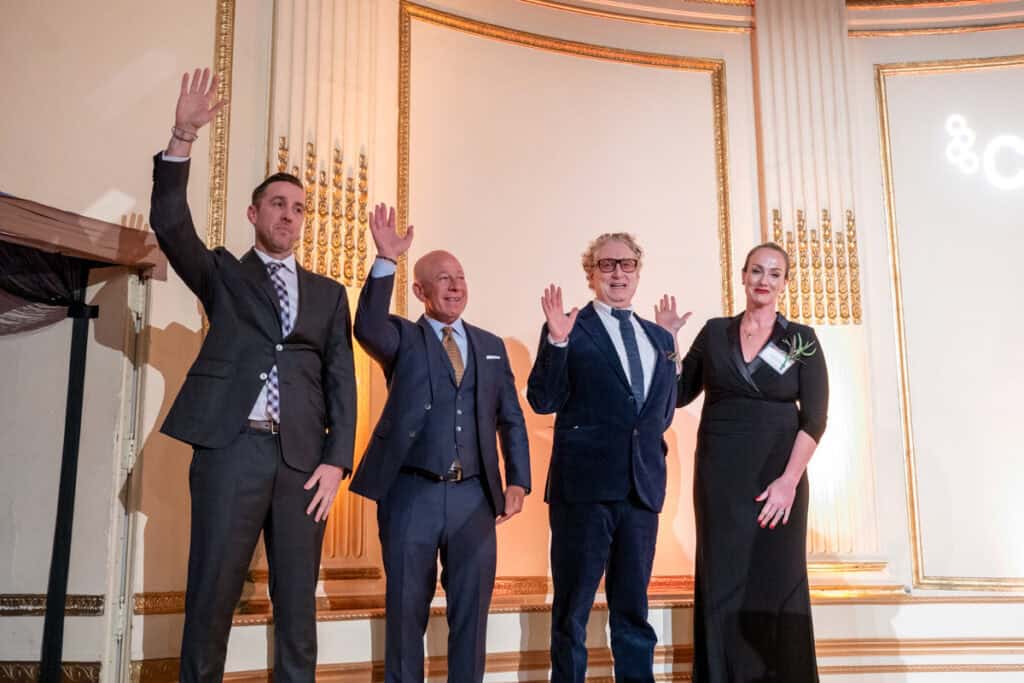
Sharon, along with other patients like Brendan Connors, Dan Engel, and Bernie Telsey, are all still here to tell their story because of immunotherapy. However, these breakthroughs in immunotherapy would never have saved a single life, let alone impact the millions of patients living longer, if not for the clinicians who lead cutting-edge clinical trials and advocate for their patients.
Recognized for his incredible efforts for both leading groundbreaking clinical trials and advocating for his patients, Jedd Wolchok, MD, PhD, Meyer Director of the Sandra and Edward Meyer Cancer Center at Weill Cornell Medicine, and valued Associate Director of CRI’s Scientific Advisory Council, was honored with an engraved stethoscope from the patients whose lives he helped save.
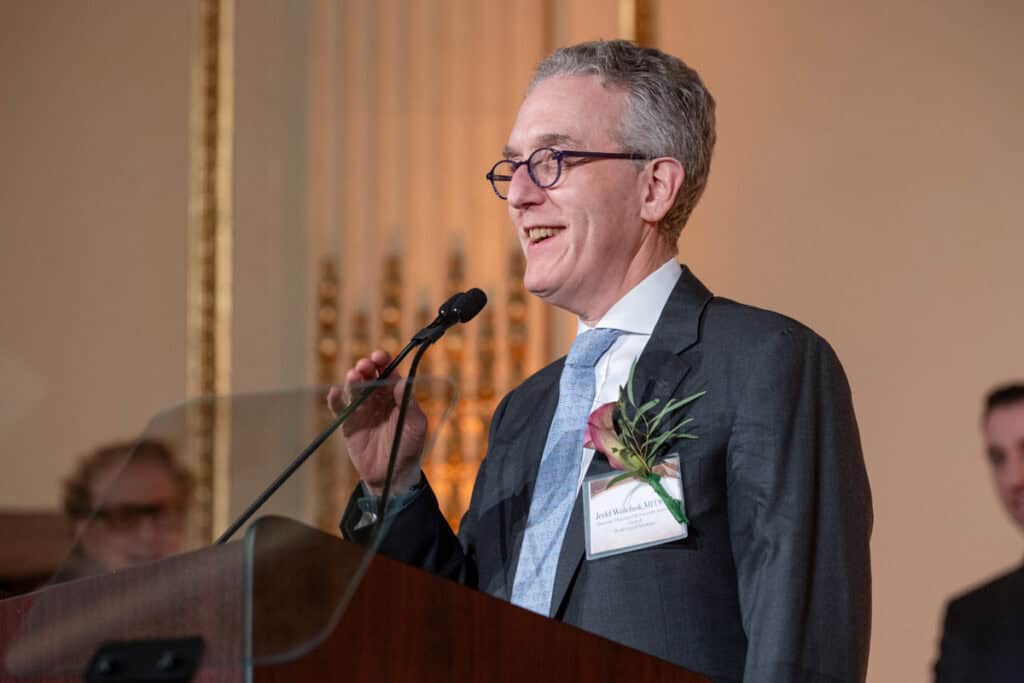
“I accept this on behalf of all the people that made these lives possible,” Dr. Wolchok said during his remarks. “And our work is really, really not done. There are still way too many people dying from cancer, and that is why the gratitude does not just extend to the people who helped to bring the medicines forward, but the gratitude is to all the support of organizations like CRI who help us get this work done.”
Bernie Telsey’s Story of Survival
Bernie Telsey is known for his Broadway career, the casting mastermind behind hit shows like Rent, Wicked, and Hamilton, just to name a few.
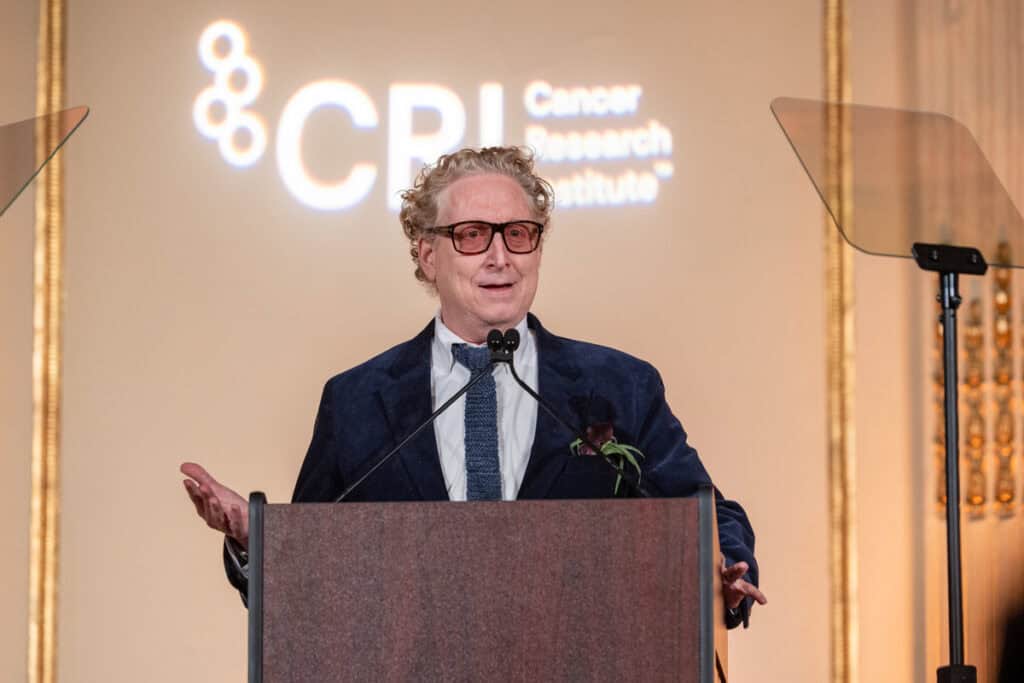
But Bernie never expected the threat of an early curtain call on his life. In December 2024, an accidental fall while walking up the stairs at work resulted in a pathological break. Telsey would soon learn he had stage IV cancer.
“I learned that I had metastatic melanoma – cancer that had spread to the bones throughout my body,” Bernie recalls. “I was shocked. How could that be? I felt fine. I never even take a sick day. Thoughts of two close friends that I recently lost to cancer flooded my head, and I thought, it’s over. I’m going to die.”
But thanks to immunotherapy and the guidance of Dr. Jedd Wolchok, Bernie went from never hearing of the word immunotherapy to being a stage IV melanoma survivor in just six months.
“The real reason I’m here is immunotherapy. It didn’t just save my life, it gave me more life to live,” Bernie said. “The research supported by the Cancer Research Institute is the reason I’m standing here tonight—and the reason thousands of others are, too. What you’re supporting tonight doesn’t just advance science; it gives people their lives back.”
Frederick W. Alt Award: A Homecoming of Sorts
After dinner, the night continued with the Frederick W. Alt Award for New Discoveries in Immunology – an honor that recognizes a former CRI postdoctoral fellow whose work has gone on to shape the field in powerful ways.
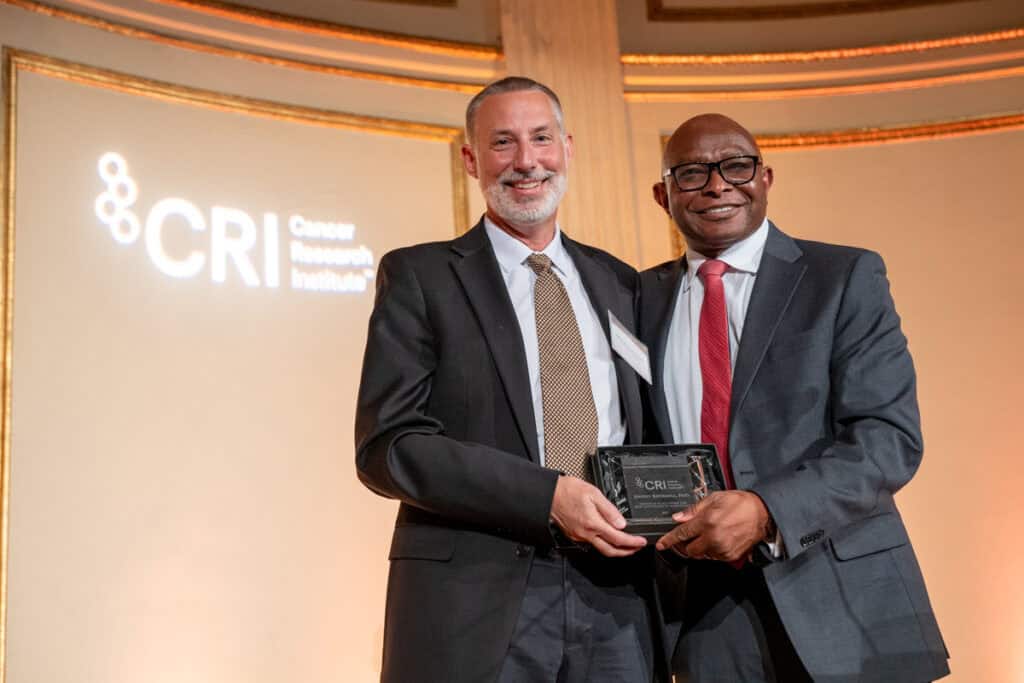
This year, the Alt Award was presented to Jeffrey Rathmell, PhD, for his groundbreaking work on the metabolic pathways that regulate immune cell function and survival. The insights from his lab have opened entirely new ways of thinking about cancer treatment: how to reprogram immune cells to make them more effective against tumors and how to intervene when metabolism drives disease.
Dr. Rathmell began his career as a CRI Irvington Postdoctoral Fellow and has since become a widely respected leader in the field.
“Your support for groups like CRI are fantastic, because these careers have ups and downs,” Dr. Rathmell said while recounting his own journey.
The Alt Award was presented to Dr. Rathmell by Kunle Odunsi, MD, PhD, the Director of the University of Chicago Comprehensive Cancer Center and Associate Director of CRI’s Scientific Advisory Council.
Oliver R. Grace Award: Recognizing a Longstanding Commitment to Advancing Cancer Research
The final award of the night was the Oliver R. Grace Award, named for CRI’s founding chairman, that recognizes individuals whose remarkable dedication has advanced the mission of CRI.
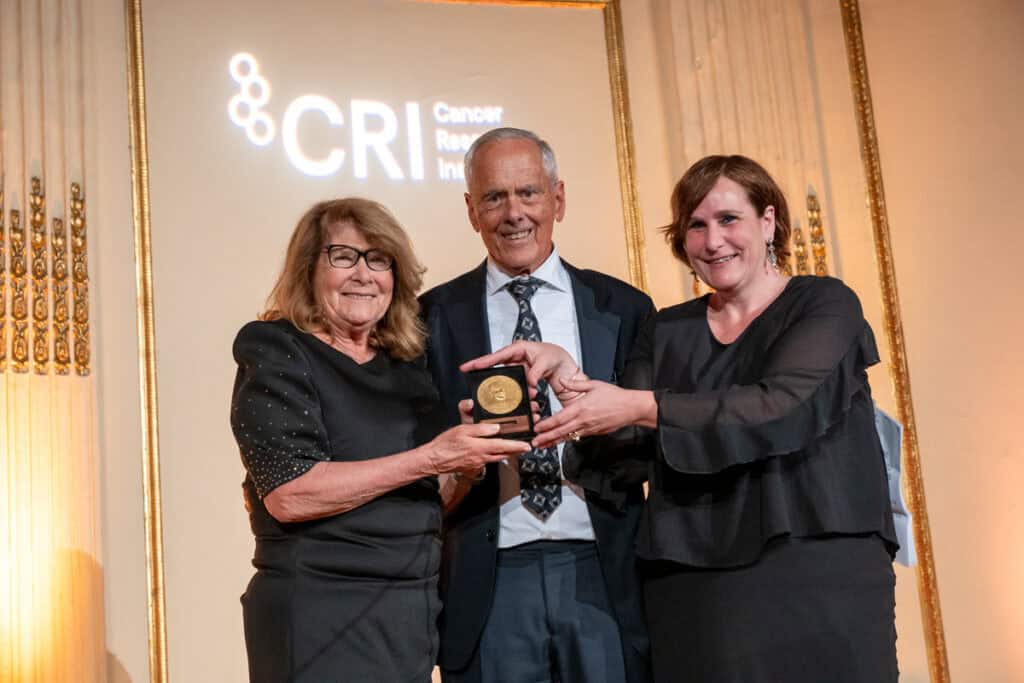
The Grace Award was presented by Andrea Schietinger, PhD, a former CRI postdoctoral fellow and one of CRI’s STARs.
The award was presented to Jane and Dick Landesman, MD, who have turned the loss of their beloved son, Keith Landesman, MD, into a community of hope and progress.
Each year, through their Sailfish Community Move for Life fundraiser, the Landesmans bring together neighbors, family, and friends to raise funds for cancer immunotherapy research. From biking and running to walking and swimming, they have built an event that unites a community in action.
Since 2013, these efforts have raised more than $2.5 million, supporting nine CRI fellows whose work is advancing cancer immunotherapy, sparking progress that will reach patients with cancer worldwide.
“It was through the commitment to generosity of these communities that we were able to raise the funds to support many research labs,” Dr. Landesman said during his remarks. “CRI has been with us the entire way.”
He also spoke to the gravity of this moment in time and encouraged everyone to do their part so that the work can continue.
“In these trying times for researchers, I would say to you that you’re extremely appreciated for your efforts and success, and to those in the audience who are supporters and donors, you are needed more than ever,” he said. “Today we hope, tomorrow we cure as we wish for a world immune from cancer.”
The Urgency of the Moment and CRI’s Continued Commitment
Dr. Zhou also spoke to the urgency of our current times and how CRI is continuing to support those fueling lifesaving immunotherapy research.
“As we celebrate this progress, our work has never been more urgent,” she said. “When federal funding was disrupted this year, CRI didn’t wait; we acted.”
In just the past year, CRI invested more than $33 million in new funding, supporting 68 grants and fellowships across 41 institutions in 15 states, and 5 countries.
CRI also committed $2.5 million to launch 10 additional postdoctoral fellowships, ensuring the next generation of scientists remain in the fight.
“And we haven’t stopped there,” said Dr. Zhou. “Earlier this month, we launched CRI’s IGNITE Award – which stands for Inspiring Growth and Nurturing Independence Through Excellence. IGNITE helps outstanding postdoctoral researchers take the leap to independence by funding their transition from trainee to junior faculty.”
By providing funding for outstanding postdoctoral researchers in immunotherapy, the IGNITE award helps to bridge the transition to independence, delivering a clear, guided pathway for young scientists when such opportunities are increasingly rare.
To learn more about this and other awards, please visit our grants page.
Courage in Motion
As the evening drew to a close, one thing was crystal clear: courage is not a single act, but a shared movement — a relentless drive forward in the pursuit of life-saving knowledge.
As Dr. Zhou emphasized, “Together, we are proving what is possible when courage meets science.”
With every breakthrough, every story, and every act of generosity, we move closer to a future where cancer no longer stands in our way. Courage is in motion — and it’s carrying us toward a world immune to cancer.
